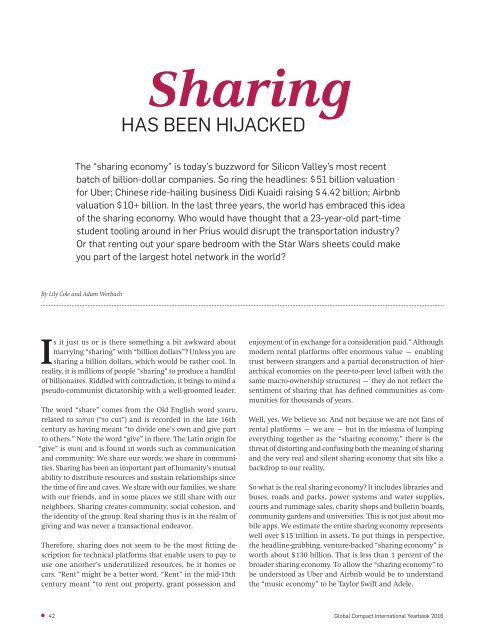Global Compact International Yearbook 2016
The Sustainable Development Goals are an ambitious agenda with 17 topics addressing the global challenges of our time. A key topic is innovation: Business must fit into planetary boundaries. This probably will not work with traditional business models. That is why we need new, fresh ideas. We need change, even when it happens in a rough, disruptive way. And the earlier the better. This is why the upcoming edition of the Global Compact International Yearbook, published in September 2016, has chosen sustainable innovation as the key topic. Also includes exclusive interviews with Angelina Jolie, Robert Redford and Sigourney Weaver. The Global Compact International Yearbook is with more than 500,000 readers one of the worlds leading CSR publications. Münster/New York 2016: 164 pages, paperback Publishing houses: macondo publishing/UN Publications Subscription (via UN Publications only): 30.00 USD (regular) 15.00 USD (reduced) ISBN13: 978-3-946284-01-7 / ISSN-Print: 2365-3396 / ISSN-Internet: 2365-340x
The Sustainable Development Goals are an ambitious agenda with 17 topics addressing the global challenges of our time. A key topic is innovation: Business must fit into planetary boundaries. This probably will not work with traditional business models. That is why we need new, fresh ideas. We need change, even when it happens in a rough, disruptive way. And the earlier the better. This is why the upcoming edition of the Global Compact International Yearbook, published in September 2016, has chosen sustainable innovation as the key topic.
Also includes exclusive interviews with Angelina Jolie, Robert Redford and Sigourney Weaver.
The Global Compact International Yearbook is with more than 500,000 readers one of the worlds leading CSR publications.
Münster/New York 2016: 164 pages, paperback
Publishing houses: macondo publishing/UN Publications
Subscription (via UN Publications only): 30.00 USD (regular) 15.00 USD (reduced)
ISBN13: 978-3-946284-01-7 / ISSN-Print: 2365-3396 / ISSN-Internet: 2365-340x
Create successful ePaper yourself
Turn your PDF publications into a flip-book with our unique Google optimized e-Paper software.
Sharing<br />
Has Been Hijacked<br />
The “sharing economy” is today’s buzzword for Silicon Valley’s most recent<br />
batch of billion-dollar companies. So ring the headlines: $ 51 billion valuation<br />
for Uber; Chinese ride-hailing business Didi Kuaidi raising $ 4.42 billion; Airbnb<br />
valuation $ 10+ billion. In the last three years, the world has embraced this idea<br />
of the sharing economy. Who would have thought that a 23-year-old part-time<br />
student tooling around in her Prius would disrupt the transportation industry?<br />
Or that renting out your spare bedroom with the Star Wars sheets could make<br />
you part of the largest hotel network in the world?<br />
By Lily Cole and Adam Werbach<br />
Is it just us or is there something a bit awkward about<br />
marrying “sharing” with “billion dollars”? Unless you are<br />
sharing a billion dollars, which would be rather cool. In<br />
reality, it is millions of people “sharing” to produce a handful<br />
of billionaires. Riddled with contradiction, it brings to mind a<br />
pseudo-communist dictatorship with a well-groomed leader.<br />
The word “share” comes from the Old English word scearu,<br />
related to sceran (“to cut”) and is recorded in the late 16th<br />
century as having meant “to divide one’s own and give part<br />
to others.” Note the word “give” in there. The Latin origin for<br />
“give” is muni and is found in words such as communication<br />
and community: We share our words; we share in communities.<br />
Sharing has been an important part of humanity’s mutual<br />
ability to distribute resources and sustain relationships since<br />
the time of fire and caves. We share with our families, we share<br />
with our friends, and in some places we still share with our<br />
neighbors. Sharing creates community, social cohesion, and<br />
the identity of the group. Real sharing thus is in the realm of<br />
giving and was never a transactional endeavor.<br />
Therefore, sharing does not seem to be the most fitting description<br />
for technical platforms that enable users to pay to<br />
use one another’s underutilized resources, be it homes or<br />
cars. “Rent” might be a better word. “Rent” in the mid-15th<br />
century meant “to rent out property, grant possession and<br />
enjoyment of in exchange for a consideration paid.” Although<br />
modern rental platforms offer enormous value – enabling<br />
trust between strangers and a partial deconstruction of hierarchical<br />
economies on the peer-to-peer level (albeit with the<br />
same macro-ownership structures) – they do not reflect the<br />
sentiment of sharing that has defined communities as communities<br />
for thousands of years.<br />
Well, yes. We believe so. And not because we are not fans of<br />
rental platforms – we are – but in the miasma of lumping<br />
everything together as the “sharing economy,” there is the<br />
threat of distorting and confusing both the meaning of sharing<br />
and the very real and silent sharing economy that sits like a<br />
backdrop to our reality.<br />
So what is the real sharing economy? It includes libraries and<br />
buses, roads and parks, power systems and water supplies,<br />
courts and rummage sales, charity shops and bulletin boards,<br />
community gardens and universities. This is not just about mobile<br />
apps. We estimate the entire sharing economy represents<br />
well over $ 15 trillion in assets. To put things in perspective,<br />
the headline-grabbing, venture-backed “sharing economy” is<br />
worth about $ 130 billion. That is less than 1 percent of the<br />
broader sharing economy. To allow the “sharing economy” to<br />
be understood as Uber and Airbnb would be to understand<br />
the “music economy” to be Taylor Swift and Adele.<br />
42<br />
<strong>Global</strong> <strong>Compact</strong> <strong>International</strong> <strong>Yearbook</strong> <strong>2016</strong>

















